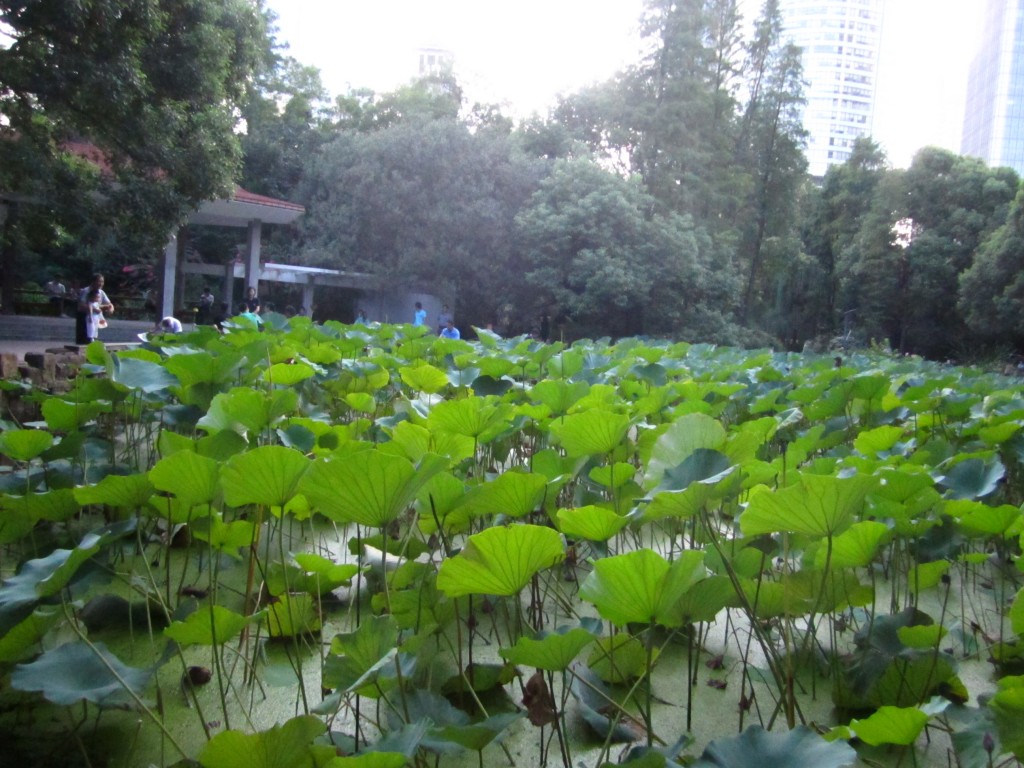Getting off the crowded peak hour morning bus in Shanghai, I walked into 魯迅公園 (Lu Xun Park), a childhood park my grandfather often took me to in the early 90’s. Spending time there was a refreshing break from the claustrophobic cabin fever I had developed living in my old home in one of Shanghai’s few remaining demolished neighbourhoods. Away from television’s incessant noise, the horns and the smog, I found early retirees creating their own devices of entertainment.
With few public facilities such as libraries, parks are fertile grounds for gossiping, dancing, singing and even matchmaking. This might be a result of China’s incredibly early retiring age in recent years in the city (you would struggle to find city women working into their 50s and city men into their late 50s).
Inside the gates, I thought I had stumbled on a concert in the park. Loud folk music clashed against each other inside the front entrance square as hundreds of elderly danced under green canopies. There were spaces for couples to dance to old ballads, spaces of people practising Tai-Chi in flowing velvety gowns of emerald, moron and navy. Singles danced to Latin music.
Around the lake I found a choir singing out old Maoist tunes, and immense passion came from a gray-haired man in his 70s who waved his shoulders to the Accordion tune.
Deeper in the park, old men brought their pet birds in wooden cages to a vantage point nestled by bamboo shoots. The dangling cages housed Asian Brown Flycatcher and Black-billed Magpies, their tunes at first piercing, and then calming.
“Young one, you stand too close, you are scaring them,” one of them chastened me.
“Excuse me, why are the newly arrived bird cages covered?” I asked.
“Let them get used to the environment first by listening and feeling,” they replied.
Even spouses can be found here. Large crowds mingled around glossy small posters hung up like underwear between branches.
“Woman: 35 years old, hardworking, good at housework, 1.65m, stable career”, read one.
Parents came here to find potential spouses for their children, usually swapping numbers with suitable candidates. Dates are arranged for their children to meet.
Big cities in China can be stressful, a little artificial, certainly commercial. Take a stroll in the park for a cultural detour the next time you feel a little overwhelmed, you won’t regret it.
清晨,我下了满载上班族的公共汽车,径直走进了鲁迅公园。记得在我小的时候,那会儿还是90年代初,我的祖父常常带我去那儿玩。我从前患有有闭恐惧症,住在 上海为数不多的破旧公寓里。而我在公园里呆的时间久了,我的病也好转了。为了远离电视的吵闹声、喇叭的喧闹和烟尘的污染,我发现那些早退休的人们创造了一 种他们独有的娱乐休闲方式。
极度缺乏类似图书馆的公共设施,公园成了聊天、跳舞、唱歌、甚至做媒的好地方。这也许是中国人退休尤其早的一个原因吧。(你会发现城市里的女性在50多岁就退休了,而男性也在不到60岁的时候就退休了。)
走进公园大门,我意识到自己误打误撞进入了一场音乐会。大声的民族音乐此起彼伏,公园门前的广场树荫下,几百个老年人正尽情跳着舞。有的人伴随着民族风乐曲跳着交谊舞;有的人穿着翡翠绿或海军蓝的长袍打着柔软的太极;还有的人独自跳着拉丁。
在湖边,我看到一个唱诗班,正唱着毛主席的诗词。一位花白头发古稀之年老爷爷正饶有激情地跟随着手风琴的调子摇晃着他的肩膀。
走到公园的更深处,老人们纷纷把他们装在木制鸟笼里的家养鸟儿们挂在竹子上,有北灰鹟,有喜鹊。他们时而唧唧喳喳,时而安静乖巧。
“年轻人,你站得太近了,吓到它们了,”一个老人拦住了我。
“不好意思,不过为什么新拿过来的鸟笼要用布遮盖着呢?”我问道。
“先要让它们用聆听和感觉习惯周围的环境,”他们答道。
就连征婚启事也能在这里看到。大堆的人挤在那一张张小海报前,就好像在树枝上挂着内裤一样奇怪。
“女性:35岁,工作认真、擅长家务。身高1米65,有稳定的工作。”我随意读了一张。
家长们来这边为孩子寻找潜在的对象,如果看到合适的人选,常常会交换电话,然后再安排孩子们相亲。
生活在像中国这样的大国难免会有很大的压力,有时感觉人际关系虚伪,过度的商业化。那么,当你感到不堪重负的时候,不妨抽空来公园走走吧,你一定不会后悔的。


![[Only in Shanghai] Parks: where Chinese old folks live<!--:zh-->[上海独景] 公园:中国老年人的家](https://www.oneinabillionvoices.org/wp-content/uploads/2013/02/peoplespark.jpg)